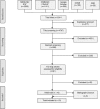Methodological considerations in clinical outcomes assessment of pharmacy-based minor ailments management: A systematic review
- PMID: 30286166
- PMCID: PMC6171901
- DOI: 10.1371/journal.pone.0205087
Methodological considerations in clinical outcomes assessment of pharmacy-based minor ailments management: A systematic review
Abstract
Background: The accessibility of services within community pharmacies provides an ideal opportunity to manage minor ailments, yet over £1.1 billion is spent by the National Health Service (NHS) in the United Kingdom (UK) in managing minor ailments in high cost settings. There is a need to review the evidence base around clinical effectiveness of pharmacy-based management of minor ailments since the absence of such may lead to under-utilisation of pharmacy services and non-implementation of available pharmacy service models. This study aimed to systematically review the methodological approaches used to assess clinical outcomes of pharmacy-based management of minor ailments in the research literature.
Methods: A systematic review was conducted to identify relevant literature using the following databases: Medline, EMBASE, CINAHL, IPA, CRD, CDSR, and Google Scholar from publication year 2000 onwards. Studies were included if they evaluated clinical outcomes of pharmacy-based management of any minor ailments, with or without a comparator setting such as Emergency Departments (EDs) or general practices. Screening and selection of titles, abstracts and full texts followed by data extraction and quality assessment (QA) was conducted. Paired researchers, from the team, reviewed papers using a protocol based on the Preferred Reporting Items for Systematic Review and Meta-Analysis Protocols (PRISMA-P). QA was undertaken using the Critical Appraisal Skills Programme (CASP). Reporting was conducted in accordance with PRISMA checklist and statements.
Results: A total of 19 studies were included. The majority of studies were observational, conducted in community pharmacies, and did not use a comparator participant group nor a comparator setting. Interventions included counselling, medicines supply and provision of advice on the management of minor ailments. One study used the randomised controlled trial (RCT) design with majority of the study utilising observational design. A range of clinical outcomes including symptom severity, pattern, resolution, and quality of life were reported. Methods used for the assessment of clinical outcomes were, overall, poorly reported. This included a lack of information on the development and validation of the data collection tools and the timing of baseline and follow-up data collection. Adverse clinical outcomes data were collected by only seven studies.
Conclusions: Currently, there are methodological limitations in the studies that have sought to assess clinical outcomes of pharmacy-based management of minor ailments. Such lack of high quality evidence may contribute to failings to shift care from high cost settings, such as EDs and general practices. Generation of high quality evidence is likely to influence public choices when seeking care for minor ailments. There is scope for development of a core outcomes set specific to minor ailments management and development of a validated methodology for measuring such outcomes in a research study.
Conflict of interest statement
The authors have declared that no competing interests exist.
Figures
References
-
- Watson MC, Ferguson J, Barton GR, Maskrey V, Blyth A, Paudyal V, et al. A cohort study of influences, health outcomes and costs of patients' health-seeking behaviour for minor ailments from primary and emergency care settings. BMJ Open. 2015. February 18;5[2]:e006261,2014–006261. 10.1136/bmjopen-2014-006261 - DOI - PMC - PubMed
-
- Fielding S, Porteous T, Ferguson J, Maskrey V, Blyth A, Paudyal V, et al. Estimating the burden of minor ailment consultations in general practices and emergency departments through retrospective review of routine data in North East Scotland. Fam Pract. 2015;32[2]:165–72. 10.1093/fampra/cmv003 - DOI - PMC - PubMed
-
- NHS England. Community Pharmacy- helping provide better quality and resilient urgent care. Available: https://www.england.nhs.uk/wp-content/uploads/2014/11/comm-pharm-better-.... Accessed 06 September 2017.
-
- Pillay N, Tisman A, Kent T, Gregson J. "The economic burden of minor ailments on the National Health Service (NHS) in the UK." Self-Care 1 [2010]: 105–16.
-
- Cernasev A, Hadsall R, Cordina M. The Pharmacists Attributes in Advising Patients in Independently Owned Maltese Pharmacies. Pharmacol Pharm. 2014;5(05]:462.
Publication types
MeSH terms
LinkOut - more resources
Full Text Sources


